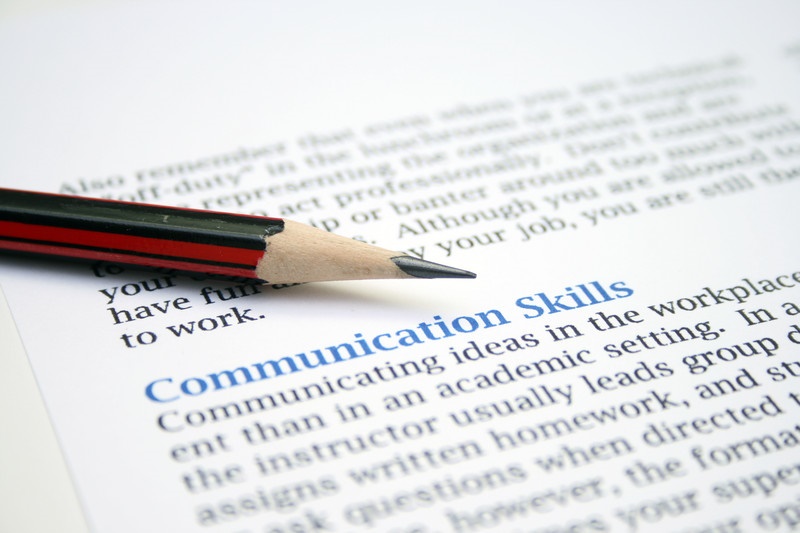
Communication is regularly cited as one of the most—if not the most—crucial factors to building and maintaining healthy relationships. As stated by the PBS program The Emotional Life:
“How couples behave when solving problems together or arguing can predict the character and success of their relationship. A raised eyebrow, a hand on the arm, or a greeting all may seem like small things, but research shows that the quality of everyday interactions can make or break a relationship.”
Likewise, communication skills are equally important at work: one 2014 survey of about 600 employers found that communication skills are the most in-demand skill set among recruiters. In fact, of five leading skill sets employers consider most valuable when rendering a hiring decision, communications skills top the list.
From maintaining healthy relationships to getting hired to getting promoted, communication has an affect on almost every aspect of our lives. Working to improve our communication skills, then, isn’t a bad place to start if we wish to make some positive improvements.
How to become a highly effective communicator
Becoming an effective communicator is not complicated, but it does call for some elementary skills and the willingness to practice.
Step one is to recognize that the objective of any communication situation is an honest, open-ended exchange of ideas where all parties can be heard and acknowledged. This requires assertive and articulate speaking abilities, but, just as critically, requires robust listening skills.
In truth, listening skills may be the most vital part of communication. The explanation is simple: if you are unable to understand what is being said, you won’t be able to articulate a relevant and meaningful reply. This lack of ability to understand is the root cause of many misunderstandings, arguments, and bad feelings.
Improving listening skills, then, is the single most important thing you can do to become a superior communicator. And while active listening can be challenging on its own, hearing loss makes things even trickier.
Hearing loss and the obstacles to active listening
Active listening requires investing all attention to the speaker. Only by thoroughly comprehending the communication can you produce a relevant and significant response, and that’s why inadequate speakers are almost always distracted listeners.
But what produces the distraction?
Here are four common sources of distraction and how hearing loss has a tendency to make things worse:
Distraction # 1: Stress
If you’ve ever been highly stressed or anxious, you know how difficult it can be to concentrate. You’re more likely to be concentrated on your own thoughts and emotions rather than on the speaker’s, and you’re very likely to lose out on critical non-verbal signs and to misinterpret what other people are saying.
Regarding stress, hearing loss by itself is a leading source. You may feel anxious about missing out on important information or coming up with embarrassing replies. And, the struggle to hear speech in the existence of hearing loss is a source of stress and strain itself.
Distraction # 2: Lack of focus
Active listening is challenging because our minds have the normal tendency to wander. You can’t simultaneously listen to the speaker and daydream, check your email, text message, and prepare what you’re going to say next. Remaining inside of the present moment and concentrating on the speaker is the only way to pick up on the subtle points of the speaker’s message.
Hearing loss produces a lack of focus because it removes you from the present moment. If you’re attempting to determine what the speaker just said, you’re also losing out on what they’re saying at the moment. The constant catching-up almost ensures that you’ll never properly understand the message.
Distraction # 3: Misunderstanding
Stress and lack of focus can both get you to misunderstand the message. This introduces the possibility of you becoming upset or agitated with a message that the other person never actually intended to send.
This at minimum wastes time and at worst manufactures bad feelings. Not to mention the irritation of the individual who is consistently misunderstood.
Distraction # 4: Lack of confidence
If you lack self-confidence, you’ll find it very difficult to assert yourself while socializing. You’ll likely also be preoccupied with what the other person thinks rather than on the content of what they’re saying.
Hearing loss makes things worse, not surprisingly, because your misinterpretations could be perceived as a sign that you just don’t understand the message. If you’re constantly asking for clarification on simplistic points, it makes it difficult to feel sufficiently confident to be assertive.
How hearing aids can help you
Becoming a better communicator necessitates becoming a better listener, but how can you come to be a better listener if you have hearing loss? You have several choices, but because hearing aids have advanced so far in terms of recognizing and amplifying speech, they actually are the perfect solution.
Modern digital hearing aids have a host of remarkable features made specifically for speech recognition. Many hearing aid models have background noise suppression, directional microphones, and sophisticated digital processing so that speech comes through loud and clear.
Without needing to struggle to hear speech, you can concentrate all of your efforts on understanding the message. Then, as you become a better active-listener, your self-confidence, assertiveness, and speaking skills will all take care of themselves.
If you have hearing loss and you’re prepared to begin strengthening your distraction-free listening skills, arrange your hearing test today.
